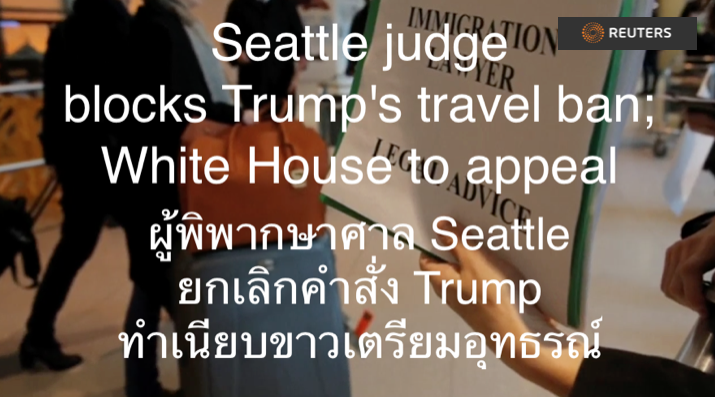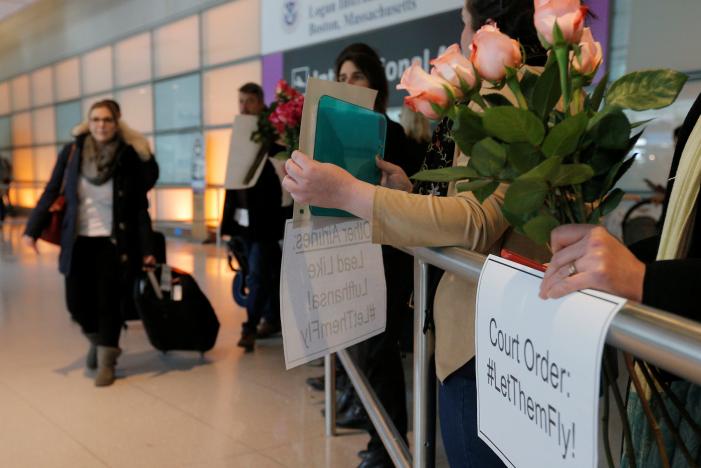|
Judge's ruling gives hope to some Mideast travellers, Trump calls it ridiculous
By Issam Abdullah, Kinda Makieh and Julia Edwards Ainsley | BEIRUT/DAMASCUS/WASHINGTON Citizens of seven mainly Muslim countries banned from the United States by President Donald Trump can resume boarding U.S.-bound flights, major airlines said on Saturday, after a Seattle judge blocked the executive order. The ruling gave hope to some Middle East travellers but left them unclear how long the new travel window might last. Trump denounced the judge on Twitter and said the decision would be quashed. "The opinion of this so-called judge, which essentially takes law-enforcement away from our country, is ridiculous and will be overturned!" the president said. The travel ban, which Trump says is needed to protect the United States against Islamist militants, has sparked travel chaos around the world and condemnation by rights groups who have called it racist and discriminatory. "Interesting that certain Middle-Eastern countries agree with the ban. They know if certain people are allowed in it's death & destruction!" Trump tweeted. "When a country is no longer able to say who can, and who cannot, come in & out, especially for reasons of safety & security - big trouble!" In the wake of Friday's ruling, Qatar Airways was the first to say it would allow passengers from Iran, Iraq, Libya, Somalia, Sudan, Syria and Yemen to resume flying to U.S. cities if they had valid documents. Fellow Gulf carriers Etihad and Emirates said they would do the same, as did Air France, Spain's Iberia and Germany's Lufthansa. Officials in Lebanon and Jordan said they had received no new instructions on the issue. The White House said it planned to appeal as soon as possible. Ibrahim Ghaith, a Syrian barber who fled Damascus in 2013, told Reuters in Jordan: “Today we heard that the measures may have been abolished but we are not sure if this is just talk. If they go back on the decision, people will be overjoyed." Iraqi refugee Nizar al-Qassab told Reuters in Lebanon: "If it really has been frozen, I thank God, because my wife and children should have been in America by now." The 52-year-old said his family had been due to travel to the United States for resettlement on Jan. 31. The trip was cancelled two days before that, and he was now waiting for a phone call from U.N. officials overseeing their case. "It's in God's hands," he said. Two Sudanese travellers told Reuters they were trying to travel as soon as possible, fearing the ban might be reinstated. “I’m in a race against time," said a 31-year-old female academic who declined to be named for fear of any consequences. "Today I face a real problem in Khartoum because the international airlines are refusing to sell me a ticket to travel for fear of contradicting the President’s decision. Now I am going from one airline company to another to convince them about the court’s decision,” she said. A 34-year-old Sudanese engineer, who also did not want to be named, said: "After the court’s decision I am now trying to leave as fast as possible before the situation changes once more." U.S. Customs and Border Protection told airlines they could board travelers affected within hours of Friday's ruling, but budget airline Norwegian, which operates transatlantic flights including from London and Oslo, said many uncertainties remained about the legal position. "It's still very unclear," spokeswoman Charlotte Holmbergh Jacobsson said. "We advise passengers to contact the U.S. embassy ... We have to follow the U.S. rules." In Cairo, aviation sources said Egypt Air and other airlines had told their sales offices of Friday's ruling and would allow people previously affected by the ban to book flights. But for some who had changed their travel plans following the ban, the order was not enough reassurance. ⤴︎ |
Josephine Abu Assaleh, who was stopped from entering the United States last week with five members of her family, was hesitant to express any hope in the court ruling as she awaited word from her lawyers.
"I will not say if I have hope or not. I wait, watch, and then I build my hopes. We left the matter with the lawyers. When they tell us the decision has been cancelled, we will decide whether to go back or not,” she told Reuters in Damascus, speaking by telephone. Abu Assaleh, 60, and her family only learnt of Trump’s order after landing at Philadelphia International Airport with U.S. visas that were granted in 2016, some 13 years after they initially made their applications. VISA SUSPENSIONS Trump's order caused chaos at airports across the United States last week. Virtually all refugees were also barred, upending the lives of thousands of people who had spent years seeking asylum in the U.S. The State Department said on Friday that almost 60,000 visas were suspended following Trump's order. It was not clear whether that suspension was automatically revoked or what reception travelers with such visas might get at U.S. airports. The Washington state lawsuit was the first to test the broad constitutionality of Trump's executive order. Judge James Robart, a George W. Bush appointee, explicitly made his ruling apply across the country, while other judges in similar cases have so far issued orders concerning only specific individuals. The challenge in Seattle was brought by the state of Washington and later joined by the state of Minnesota. The judge ruled that the states have legal standing to sue, which could help Democratic attorneys general take on Trump in court on issues beyond immigration. Washington's case was based on claims that the state had suffered harm from the travel ban, for example students and faculty at state-funded universities being stranded overseas. Amazon.com and Expedia, both based in Washington state, had supported the lawsuit, asserting that the travel restrictions harmed their businesses. Tech companies, which rely on talent from around the world, have been increasingly outspoken in their opposition to the Trump administration's anti-immigrant policies. Judge Robart probed a Justice Department lawyer on what he called the "litany of harms” suffered by Washington state’s universities, and also questioned the use of the Sept. 11, 2001, attacks on the United States as a justification for the ban. Robart said no attacks had been carried out on U.S. soil by individuals from the seven countries affected by the travel ban since that assault. For Trump’s order to be constitutional, Robart said, it had to be “based in fact, as opposed to fiction.” The White House said in a statement: “At the earliest possible time, the Department of Justice intends to file an emergency stay of this outrageous order and defend the executive order of the president, which we believe is lawful and appropriate." It added: "The president’s order is intended to protect the homeland and he has the constitutional authority and responsibility to protect the American people." Washington Governor Jay Inslee celebrated the decision as a victory for the state, adding: "No person - not even the president - is above the law." --------------------------------------------------------------------------------------------------------------- (Additional reporting by Alexander Cornwell in Dubai, Tom Perry and Laila Bassam in Beirut, Suleiman al-Khalidi in Amman, Khaled Abdelaziz in Khartoum, Alister Doyle in Oslo, Dan Levine in Seattle, Scott Malone in Boston, Georgina Prodhan in Frankfurt, Laurence Frost in Paris, Asma Alsharif in Cairo, Jesus Aguado in Madrid, Mica Rosenberg in New York, Brian Snyder in Boston and Lawrence Hurley, Lesley Wroughton, Julia Edwards and Susan Heavey in Washington, Tom Arnold and Alexander Cornwell in Dubai; Editing by Mark Trevelyan) --------------------------------------------------------------------------------------------------------------- http://www.reuters.com/article/us-usa-trump-immigration-idUSKBN15I1CM |
|
POLITICS | Sat Feb 4, 2017 | 3:47am EST
Seattle judge blocks Trump's travel ban; White House to appeal By Dan Levine and Scott Malone | SEATTLE/BOSTON A Seattle federal judge on Friday put a nationwide block on U.S. President Donald Trump's week-old executive order that had temporarily barred refugees and nationals from seven countries from entering the United States. The judge's temporary restraining order represents a major setback for Trump's action, though the White House said late Friday that it believed the ban to be "lawful and appropriate" and that the U.S. Department of Justice would file an emergency appeal. Still, just hours after the ruling, U.S. Customs and Border Protection told airlines they could board travelers who had been affected by the ban. Trump's Jan. 27 order caused chaos at airports across the United States last week as some citizens from Iran, Iraq, Libya, Somalia, Sudan, Syria and Yemen were denied entry. Virtually all refugees were also barred, upending the lives of thousands of people who had spent years seeking asylum in the U.S. The State Department said Friday that almost 60,000 visas were suspended in the wake of Trump's order; it was not clear Friday night whether that suspension was automatically revoked or what travelers with such visas might confront at U.S. airports. While a number of lawsuits have been filed over Trump's action, the Washington state lawsuit was the first to test the broad constitutionality of the executive order. Judge James Robart, a George W. Bush appointee, explicitly made his ruling apply across the country, while other judges facing similar cases have so far issued orders concerning only specific individuals. The challenge in Seattle was brought by the state of Washington and later joined by the state of Minnesota. The judge ruled that the states have legal standing to sue, which could help Democratic attorneys general take on Trump in court on issues beyond immigration. Washington's case was based on claims that the state had suffered harm from the travel ban, for example students and faculty at state-funded universities being stranded overseas. Amazon.com and Expedia, both based in Washington state, had supported the lawsuit, asserting that the travel restrictions harmed their businesses. Tech companies, which rely on talent from around the world, have been increasingly outspoken in their opposition to the Trump administration's anti-immigrant policies. Judge Robart probed a Justice Department lawyer on what he called the "litany of harms” suffered by Washington state’s universities, and also questioned the administration's use of the Sept. 11, 2001, attacks on the United States as a justification for the ban. Robart said no attacks had been carried out on U.S. soil by individuals from the seven countries affected by the travel ban since that assault. For Trump’s order to be constitutional, Robart said, it had to be “based in fact, as opposed to fiction.” Gulf carrier Qatar Airways will allow passengers barred by an executive order last week to board flights to the United States, after Robart's order, a spokeswoman told Reuters. But for some who had changed their travel plans following the ban, the order was not enough reassurance. Opponents of U.S. President Donald Trump's executive order travel ban greet international travelers at Logan Airport in Boston, Massachusetts, U.S. February 3, 2017. REUTERS/Brian Snyder
In Dubai, Tariq Laham, 32, and his fiancee Natalia had scrapped plans to travel to the U.S. after their July wedding in Poland, where Natalia is from. Laham said the couple would not reverse their decision. "It is just too risky," said Laham, a Syrian who works as a director of commercial operations at a multinational technology company. "Everyday you wake up and there is a new decision." ⤴︎ |
"OUTRAGEOUS ORDER” The White House said it would file an appeal as soon as possible. “At the earliest possible time, the Department of Justice intends to file an emergency stay of this outrageous order and defend the executive order of the president, which we believe is lawful and appropriate,” the White House said in a statement. "The president’s order is intended to protect the homeland and he has the constitutional authority and responsibility to protect the American people.” Washington Governor Jay Inslee celebrated the decision as a victory for the state, adding: "No person - not even the president - is above the law.” The judge's decision was welcomed by groups protesting the ban. “This order demonstrates that federal judges throughout the country are seeing the serious constitutional problems with this order,” said Nicholas Espiritu, a staff attorney at the National Immigration Law Center. Eric Ferrero, Amnesty International USA spokesman, lauded the short-term relief provided by the order but added: "Congress must step in and block this unlawful ban for good.” But the fluid legal situation was illustrated by the fact that Robart's ruling came just hours after a federal judge in Boston declined to extend a temporary restraining order allowing some immigrants into the United States from countries affected by Trump's three-month ban. A Reuters poll earlier this week indicated that the immigration ban has popular support, with 49 percent of Americans agreeing with the order and 41 percent disagreeing. Some 53 percent of Democrats said they "strongly disagree" with Trump's action while 51 percent of Republicans said they "strongly agree.” At least one company, the ride-hailing giant Uber, was moving quickly Friday night to take advantage of the ruling. CEO Travis Kalanick, who quit Trump's business advisory council this week in the face of a fierce backlash from Uber customers and the company's many immigrant drivers, said on Twitter: "We have a team of in-house attorneys who’ve been working night & day to get U.S. resident drivers & stranded families back into country. "I just chatted with our head of litigation Angela, who’s buying a whole bunch of airline tickets ASAP!! #homecoming #fingerscrossed" FOUR STATES IN COURT The decision in Washington state came at the end of a day of furious legal activity around the country over the immigration ban. The Trump administration has justified its actions on national security grounds, but opponents have labeled it an unconstitutional order targeting people based on religious beliefs. In Boston, U.S. District Judge Nathan Gorton expressed skepticism during oral arguments about a civil rights group's claim that Trump's order represented religious discrimination, before declining to extend the restraining order. U.S. District Judge Leonie Brinkema in Alexandria, Virginia, ordered the federal government to give the state a list by Thursday of "all persons who have been denied entry to or removed from the United States.” The state of Hawaii on Friday also filed a lawsuit alleging that the order is unconstitutional and asking the court to block the order across the country. He lists several examples of Syrian friends from around the world, whose work and personal life had been thrown into disarray by Trump's orders. One has been unable to visit family residing in the U.S., while another was unsure whether they would be able to take up a job offer in California after their U.S. visa appointment was canceled in the wake of the ban. (Additional reporting by Mica Rosenberg in New York, Brian Snyder in Boston and Lawrence Hurley, Lesley Wroughton, Julia Edwards and Susan Heavey in Washington, Tom Arnold and Alexander Cornwell in Dubai; Writing by Jonathan Weber and Kristina Cooke; Editing by Bill Rigby, Nick Macfie and Alexander Smith) Pictures: Reuters video http://www.reuters.com/article/us-usa-trump-immigration-idUSKBN15I1CM |
|
|











